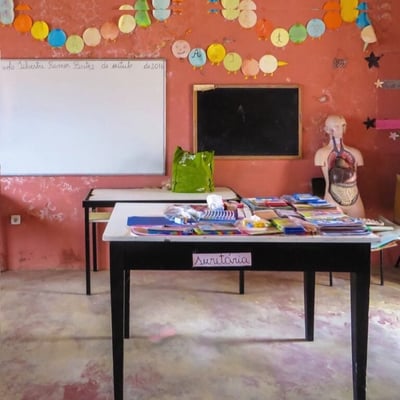1
00:00:03,216 –> 00:00:06,696
A Rute é professora do ensino básico
{{Rute is a primary school teacher}}
2
00:00:06,696 –> 00:00:11,196
e dá aulas de inglês a alunos do 5º ano.
{{and gives English classes to 5th grade students.}}
3
00:00:11,196 –> 00:00:16,396
Ensinar é aquilo que a Rute mais gosta de fazer na vida.
{{Teaching is what Rute likes to do most in life.}}
4
00:00:16,396 –> 00:00:18,296
Durante o ano letivo,
{{During the school year,}}
5
00:00:18,296 –> 00:00:23,236
a Rute tem de preparar e corrigir os testes dos alunos.
{{Rute has to prepare and correct the students’ tests.}}
6
00:00:23,236 –> 00:00:25,856
A Rute é casada com a Carolina
{{Rute is married to Carolina}}
7
00:00:25,856 –> 00:00:30,316
e o casal tem dois filhos – o Sebastião e o Henrique.
{{and the couple have two children – Sebastian and Henry.}}
8
00:00:30,316 –> 00:00:32,516
Para além de trabalhar na escola,
{{Besides working at the school,}}
9
00:00:32,516 –> 00:00:36,136
e, às vezes, levar trabalho para casa,
{{and sometimes taking work home,}}
10
00:00:36,136 –> 00:00:39,516
a Rute faz muitas das tarefas domésticas.
{{Rute does a lot of the housework.}}
11
00:00:39,516 –> 00:00:43,896
Arrumar, limpar, lavar e estender a roupa,
{{Tidying up, cleaning, washing and hanging clothes,}}
12
00:00:43,896 –> 00:00:46,576
fazer comida e passar a ferro
{{making food, and ironing}}
13
00:00:46,576 –> 00:00:50,116
são tarefas que fazem parte da rotina da Rute.
{{are tasks that make up part of Rute’s routine.}}
14
00:00:50,116 –> 00:00:52,696
Se não fosse a ajuda da Carolina,
{{If it wasn’t for Carolina’s help,}}
15
00:00:52,696 –> 00:00:57,116
a Rute não conseguia dar conta de tantos afazeres.
{{Rute couldn’t handle all the chores.}}
16
00:00:57,116 –> 00:01:01,756
A Carolina vai buscar o Sebastião e o Henrique à escola,
{{Carolina goes to pick up Sebastian and Henry from school,}}
17
00:01:01,756 –> 00:01:04,376
ajuda-os a fazer os trabalhos de casa
{{helps them do their homework,}}
18
00:01:04,376 –> 00:01:05,836
e faz o jantar.
{{and makes dinner.}}
19
00:01:05,836 –> 00:01:08,816
Cozinhar não é o forte da Carolina,
{{Cooking is not Carolina’s strength,}}
20
00:01:08,816 –> 00:01:10,776
mas ela esforça-se.
{{but she tries hard.}}
21
00:01:10,776 –> 00:01:16,416
A Rute tenta que o fim de semana seja inteiramente dedicado à família.
{{Rute tries to make the weekend entirely dedicated to the family.}}
22
00:01:16,416 –> 00:01:20,256
As atividades preferidas do Sebastião e do Henrique
{{Sebastião and Henrique’s favourite activities}}
23
00:01:20,256 –> 00:01:23,496
são correr, andar de bicicleta,
{{are running, riding bike[s],}}
24
00:01:23,496 –> 00:01:27,676
jogar à bola, passear e ir à praia.
{{playing ball, walking, and going to the beach.}}
25
00:01:27,676 –> 00:01:29,116
Aos domingos à noite,
{{On Sunday nights,}}
26
00:01:29,116 –> 00:01:32,716
a família aproveita para comer pizza,
{{the family takes the opportunity to eat pizza,}}
27
00:01:32,716 –> 00:01:35,476
o prato preferido dos meninos,
{{the boys’ favorite dish,}}
28
00:01:35,476 –> 00:01:37,176
e ver televisão.
{{and watch TV.}}
 We respect your privacy and have a ZERO TOLERANCE for spam.
We respect your privacy and have a ZERO TOLERANCE for spam.
















What is the primary difference between afazeres and tarefas?
To some extent, they are synonyms. But afazeres more often refers to househould chores, while tarefas is used more broadly.
If that dialogue is in the “easier” category I am in BIG trouble.
Don’t worry, these categories are just an estimate! 🙂 These are a bit easier: Beginner Level Shorties
I agree with Howard Heller, I found this a challenge due to some words and phrases I did not know.
Whilst I would like to find that I understand everything, I realise that new words and phrases provide further opportunities for learning.
Thanks guys for a great website
Laura Parsons
I normally read without translation. Then read with translation. Then listen with, then without. This was difícil mas I was eventually pleased the story.
What a happiness family!!
Que idade tem os alunos de 5°ano em portugal? Não sei nada sobre o sistema de educacão em portugal. Podia ser um ideia para um novo unido.
Desculpe. O erro é meu! Eu encontro a unidade sobre educação mais à frente.
Is “não conseguia dar conta“ an idiom?
Dictionary definition of Idiom: a group of words established by usage as having a meaning not deducible from those of the individual words (e.g. over the moon, see the light ).
Yes exactly, this is an idiomatic way to say it. A more literal translation would be something like “she couldn’t give count”, which doesn’t mean much. 🙂
I am wondering about why aquilo is used in “ensinar é aquilo que….” ? Could the same thing be communicated without the aquilo.
Thank you in advance for your help.
Maybe it helps if you consider that the idea behind the sentence is basically: “teaching is the thing that Rute likes to do the most”. In English, we replace “the thing that” with “what”. In Portuguese, we replace it with “aquilo que” (aquilo = the thing; that = que). Alternatively, we could also replace it with “o que”. “O” and “aquilo” are interchangeable pronouns here 🙂 But not having “aquilo” or anything else is not an option – the sentence would be grammatically incorrect.
Boa noite
Why do we use « de » in Tu és facil de entender but not in É bom ter tempo livre? Would we say É bom de estar com ela or É bom estar com ela or maybe both are wrong:) ?
Obrigado
Lester
Olá! It’s all about phrasing.
In the sentence “Tu és fácil de entender”, “tu” is the subject and the infinitive “entender” is a complement. As such, it needs to be connected to the rest of the sentence via the preposition ‘de’. If we phrased it as “É fácil entender-te”, the infinitive would actually be the subject (“Entender-te é fácil”). In this case, no connecting preposition is needed.
The same applies to the sentences “É bom ter tempo livre” (“Ter tempo livre é bom”) or “É bom estar com ela” (“Estar com ela é bom”) -> if the infinitive is the subject, no preposition is needed and adding it would be grammatically incorrect.
The explanation of “de entender” made it very clear for me, thanks Joseph!
Can you also explain the use/not use of “A” in the folllowing sentences:
elas vão ser rápidas A CHEGAR
a melhor coisa A FAZER é aceitar
nós fomos a Sintra VISITAR o palácio
elas odeiam CHEGAR atrasadas
You’re welcome!
About these sentences, if you look at them, the examples with ‘a’ work just like the sentence “Tu és fácil de entender”. They all follow the structure: subject + verb + adjective + preposition + infinitive.
– Tu és fácil de entender -> Tu (subj.) + és (verb) + fácil (adj.) + de (prep.) + entender (inf.)
– Elas vão ser rápidas a chegar -> Elas (subj.) + vão ser (verb) + rápidas (adj.) + a (prep.) + chegar (inf.)
– Aceitar é a melhor coisa a fazer (note the word order) -> Aceitar (subj.) + é (verb) + a melhor coisa (adjective phrase = o melhor) + a (prep.) + fazer (inf.)
The last two examples are structurally different and no preposition is applicable.